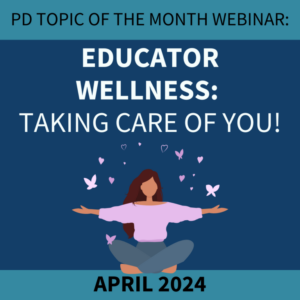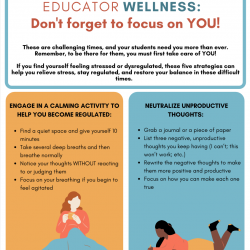At 321 Insight, we help K-12 staff meet growing student needs by providing bite-sized, relevant, and engaging job-specific PD. Get a free trial of one of our solutions to see what 321 Insight can do for your school or district!
Introduction
Teaching is one of the most demanding professions, often requiring educators to juggle between all of theirs responsibilities. With so much on their plate, the demands of daily life can influence emotional well-being, leading to stress, burnout, and exhaustion. Yet, taking care of their emotional health is crucial not only for their personal wellness but also for maintaining a positive, productive classroom environment. In a world where educational challenges are constantly evolving, it’s more important than ever for teachers to make emotional self-care a priority. By addressing their own emotional needs, teachers can build resilience, stay balanced, and ultimately create more meaningful connections with their students.
Key takeaways
- Emotional self-care dramatically improves teacher effectiveness
- Teachers who prioritize emotional self-care through mindfulness and emotional regulation are better equipped to manage classroom challenges, maintain positive relationships with students, and foster supportive learning environments.
- Addressing barriers to self-care is crucial
- Teachers face significant barriers to emotional self-care, such as guilt, heavy workloads, and lack of mental health resources. Overcoming these barriers requires systemic support, clear communication about resources, and a culture that normalizes self-care.
- Professional development supports resilience
- Tailored PD sessions, like those offered by 321 Insight, equip educators with strategies to build resilience, address trauma, and manage stress. These workshops help teachers focus on their wellness while improving classroom dynamics and student outcomes.
The Importance of Emotional Self-Care and Mental Health in Teaching
Teachers often face intense emotional demands, making emotional self-care a key factor in their well-being. Neglecting emotional self-care can lead to mental health issues such as depression, stress, and anxiety. The job involves navigating student needs, balancing administrative responsibilities, and managing large workloads, all of which can lead to stress and burnout. Research shows that when teachers practice emotional self-care, they not only protect their mental health but also create a healthier, more supportive learning environment for their students.
Burnout is common in teaching, and emotional exhaustion is a major contributor. Self-care practices like mindfulness and emotional regulation help teachers manage this exhaustion. Studies highlight the importance of integrating these practices into daily routines to reduce stress and improve job satisfaction. When teachers take care of their emotional needs, they are better equipped to connect with students, leading to better classroom outcomes.
Emotional self-care isn’t just about preventing burnout—it also has direct benefits for students. Teachers who actively manage their emotions through mindfulness or other strategies tend to create more positive, engaging classroom environments. This underscores the need for educators to make self-care a priority, not just for their own health but for the success of their students.
Mindfulness and Emotional Regulation Techniques
Mindfulness and emotional regulation are two key strategies for managing stress in the teaching profession. Incorporating breathing exercises into mindfulness practices can help achieve mental clarity and emotional well-being. Mindfulness practices, like meditation and deep breathing, help teachers stay present and reduce anxiety. Research shows that these techniques can significantly lower stress, improve sleep, and enhance mood. Teachers who incorporate mindfulness into their routine report feeling more balanced and better equipped to handle classroom challenges.
Emotion regulation, on the other hand, focuses on managing feelings in the moment. Teachers often use strategies like cognitive reappraisal—reframing negative thoughts—to control their emotional responses. This method has been shown to reduce burnout and improve teacher-student interactions. Teachers who are skilled at emotion regulation are less likely to experience emotional exhaustion and are better able to maintain positive relationships with students.
In classrooms, these practices translate to more supportive environments. Teachers who regulate their emotions effectively tend to foster better student engagement and reduce disruptive behavior. They can stay calm under pressure, which helps create a stable atmosphere for learning (Gearhart & et al. ). By focusing on both mindfulness and emotional regulation, teachers not only improve their own well-being but also enhance the overall quality of their classrooms.
Free Webinar
Your emotional wellness is the foundation of a thriving classroom.
Discover practical strategies to manage stress, build resilience, and stay balanced in our free 15-minute on-demand webinar.

Barriers to Emotional Self-Care
Teachers often face significant barriers to practicing emotional self-care, with guilt being a major factor. Identifying emotional triggers can help teachers enhance their emotional awareness and mitigate negative effects on their mental wellness. Many feel guilty about taking time for themselves, especially when they perceive that their students need more support. This guilt is compounded by the pressure to be constantly available and meet the demands of both work and home life. Teachers may avoid using mental health resources because they feel it takes away from time that could be spent on students, reinforcing this sense of guilt.
Another barrier is the overwhelming workload that teachers face, which leaves little time for self-care. Long hours, paperwork, and administrative tasks often prevent teachers from engaging in activities that could help manage their stress. Many teachers struggle to find a balance between meeting job expectations and prioritizing their well-being.
Lack of awareness about available mental health resources is another issue. Teachers, especially those early in their careers, often don’t know what support services exist for them or how to access them. This lack of knowledge can prevent them from seeking help when they need it most. Without proper guidance and communication about available resources, many teachers continue to face these barriers, leaving their emotional needs unmet.
Facilitators of Emotional Self-Care and Emotional Wellness
While barriers exist, there are also key facilitators that help teachers manage emotional self-care. Getting enough sleep is crucial for maintaining emotional balance and preventing burnout. One of the most effective supports is a strong social environment. When teachers feel supported by their peers, they are more likely to engage in self-care practices. Teaching teams or peer mentorship programs provide a sense of camaraderie, which helps teachers manage stress and set boundaries. Having colleagues who understand the demands of the job can reduce feelings of isolation and guilt, making it easier for teachers to prioritize their well-being.
Schools that create a positive, supportive climate can also facilitate emotional self-care. Administrations that encourage teachers to take time for themselves—whether through flexible schedules, professional development on mental health, or simply promoting a culture of well-being—help teachers feel more comfortable engaging in self-care practices. When school policies align with self-care goals, teachers are more likely to integrate these habits into their daily routines.
Additionally, easy access to mental health resources and self-care programs is critical. Schools that provide clear information about available support services, like counseling or mindfulness workshops, help remove the barriers teachers face in accessing care. By fostering a culture that encourages mental health and emotional self-care, schools can play a vital role in supporting their teachers’ well-being.
Free Infographic
Discover five practical self-care strategies to stay balanced, manage stress, and recharge during challenging moments.

Impact of Emotional Self-Care on Teacher Effectiveness
Emotional self-care has a direct impact on teacher effectiveness. Maintaining physical health through self-care practices can help teachers manage stress and improve their overall well-being. When teachers engage in self-care practices like mindfulness and emotional regulation, they are better able to manage classroom dynamics and maintain positive relationships with students. Teachers who are emotionally balanced create a more supportive learning environment, which leads to better student engagement and outcomes.
Research shows that teachers who practice emotional self-care experience lower levels of burnout, leading to improved job satisfaction and retention. By managing stress effectively, these teachers are more likely to remain in the profession, reducing turnover and ensuring continuity in student learning. Retaining experienced teachers helps maintain a stable educational environment, which benefits both students and the school community.
Additionally, emotionally regulated teachers are better equipped to handle difficult classroom situations. They can respond calmly to disruptive behavior, fostering a positive classroom atmosphere where students feel safe and supported. This ability to maintain composure under pressure enhances both teacher performance and student outcomes. In short, emotional self-care is not just beneficial for teachers’ well-being—it directly contributes to their effectiveness and the overall success of their classrooms.
Effective Emotional Self-Care Strategies for Students and Educators
When it comes to emotional self-care, practical strategies make all the difference. One effective approach is the “Joy Pie” strategy, which integrates five self-care techniques aimed at helping students manage negative emotions. This project has shown real potential in boosting emotional resilience and promoting regular self-care habits (Zhong, 2023). By focusing on simple, repeatable actions, students can improve their ability to handle stress.
Mindfulness and self-compassion are also powerful tools for emotional self-care. Research involving undergraduate students found that these two elements were essential for managing academic stress and personal challenges. Students who practice mindfulness and show self-compassion tend to navigate emotional hurdles more effectively (Viskovich, 2019). These practices encourage students to slow down, reflect, and approach their struggles with a kinder mindset, which is vital in high-pressure academic environments.
For educators, integrating self-care into their routines is equally critical. School-based mental health interventions have been shown to help teachers maintain emotional balance while supporting their students. A two-year study on pre-service teachers highlighted the benefits of structured programs that focus on mental health and emotional well-being, showing how crucial it is to foster self-care habits in both educators and students (Kendrick, 2024). These strategies don’t just reduce burnout — they create healthier, more productive classrooms.
More on Emotional Self-Care for Teachers
How do you take care of yourself as a teacher?
Practice mindfulness, set boundaries, and prioritize self-care routines like adequate sleep and exercise. Build a support network with peers and seek professional help when needed to manage emotional demands.
Why is self-care important for teachers?
Self-care prevents burnout, reduces stress, and supports mental health. It enhances classroom relationships and fosters a positive learning environment, benefiting both teachers and students.
How to help a burned-out teacher?
Encourage self-care through mindfulness and emotional regulation. Reduce their workload, provide mental health resources, and foster a supportive community to rebuild resilience.
Emotional Self-Care for Teachers: Next Steps
Teaching comes with intense emotional demands, and without proper support, burnout can take a toll. Professional development can play a critical role in equipping educators with tools to navigate these challenges. 321 Insight offers tailored professional development (PD) for teachers, paraprofessionals, and administrators to build resilience and foster effective classroom strategies.
Through in-person, virtual, or hybrid sessions, their skilled facilitators—former classroom teachers—provide hands-on, interactive workshops. These sessions address key areas like trauma-informed practices, self-regulation, and educator wellness, while offering actionable strategies to support all students.
Whether you’re aiming to mitigate the impacts of stress, strengthen student relationships, or build a trauma-informed mindset, 321 Insight’s PD sessions empower educators to create positive, supportive learning environments while prioritizing their own well-being.
Ready to transform your school culture? Request more information today and discover how 321 Insight can support your team.



